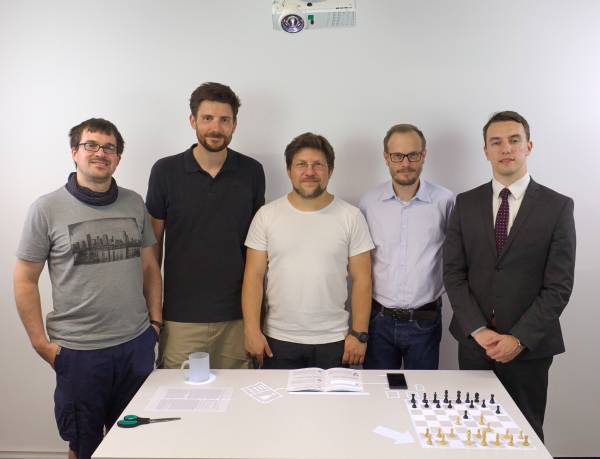My table - the interactive helper (2019-08-09)
Researchers at the University of Regensburg are developing interactive table surfaces to make everyday life easier.
It's hard to imagine our everyday lives without tables: we sit around them, eat and drink, and talk to each other. We work at tables, write and read, cook, do handcrafts, do homework or play on them. The piece of furniture is of central importance in our lives and supports a multitude of very different actions - and yet it has only been doing this passively so far.
In the research project “VIGITIA” (Networked Intelligent Objects through, on and around interactive tables in everyday life), the University of Regensburg, Bauhaus University Weimar and Munich-based EXTEND3D GmbH are now developing an intelligent lamp that projects information and digital tools onto dining tables, desks or work surfaces. The system is designed to recognize “intelligent” and “less intelligent” objects and integrate them into tabletop interaction - from smartphones to teaspoons.
However, the tables themselves are hardly changed in the process. Instead, the camera-projector system uses one or more cameras to record the table surface and objects on it in real time. The integrated projector - mounted on the ceiling or on a swivel arm - then displays the desired information or aids on the tabletop or objects with millimeter precision and without distortion.
This allows additional information and interaction options to be faded in on the objects and existing “analog” work processes to be digitally supported. For example, the system will be able to display rulers, cutting patterns or context-dependent information on request. Virtual wormholes will be used to exchange data with smartphones or other tables. The projection will also make it possible to play board games with friends around the world.
The city of Regensburg is on board as an associated partner: From 2020, the first prototypes of the interactive tables are to be installed in the DEGGINGER creative center in Regensburg's old town. There, visitors will be able to test the system while it is still in the development phase. Actors from the cultural and creative industries are invited to contribute their own wishes and ideas in workshops.
“We are primarily focusing on everyday usability and sustainability,” explains Dr. Raphael Wimmer, coordinator of the project and head of the ZD.B junior research group “Physical-Digital Affordances” at the University of Regensburg. “Instead of incorporating more and more 'smart' objects into our everyday lives, which after a year or two are just electronic waste, existing tables, tools and objects can continue to be used. For us, the focus is on the shared experience, which is only supported by technology if desired. We see this as an important advantage over other augmented reality systems, which require all users to put on display glasses.”
The joint project is funded by the German Federal Ministry of Education and Research as part of the research program "Bringing Technology to People".
At the University of Regensburg, the ZD.B junior research group “Physical-Digital Affordances” at the Chair of Media Informatics headed by Dr. Raphael Wimmer and Prof. Dr. Gunther Hirschfelder, Chair of Comparative Cultural Studies, are involved in VIGITIA.
Caption: The VIGITIA partners with a first draft of the system being developed as part of the project. From left to right: Prof. Dr. Florian Echtler (Bauhaus University Weimar), Sebastian Knopp (City of Regensburg), Dr. Raphael Wimmer (University of Regensburg), Nicolas Heuser (EXTEND3D GmbH), Felix Hecker (VDI|VDE|IT).
Contact for media
Dr. Raphael Wimmer
ZD.B Junior Research Group “Physical-Digital Affordances”
Chair of Media Informatics
Phone: 0941 46297531
E-mail: raphael.wimmer@ur.de
